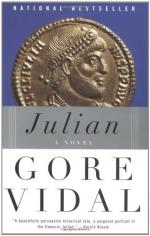|
This section contains 379 words (approx. 1 page at 400 words per page) |

|
XVII Summary
Julian begins work to strengthen the followings of the "true gods." He calls Christianity a "cult" and though he declares religious freedom, is working against Christianity. He meets with those at the head of religious groups other than the Christians and speaks frankly of his disdain for Christianity. Julian says the "Galilean," as he calls Jesus, was "a child" compared to Plato or Aristotle. He does admit that the moral teaching of Christianity is good in that Jesus taught honor, sobriety and goodness. Julian believes that Hellenism has failed simply because of a lack of organization. Julian's friend, Maximus, arrives in Constantinople, and Julian presents him to the political leaders. Priscus reveals that Maximus and his wife later made a suicide pact. She purchased poison and killed herself, but Maximus backed out. Julian again trusts in the signs of the true gods to...
(read more from the XVII Summary)
|
This section contains 379 words (approx. 1 page at 400 words per page) |

|




